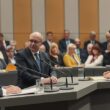The resounding endorsement of a Munich Olympic bid, secured by a 66% vote in a surprisingly high-turnout citizens’ referendum, has emboldened North Rhine-Westphalia’s (NRW) Minister-President Hendrik Wüst to aggressively pursue his state’s own candidacy for the 2036, 2040 or 2044 Summer Games. Wüst framed the Munich outcome not just as a Bavarian decision, but as a national signal indicating Germany’s renewed appetite for hosting the global sporting event.
While publicly championing a “fair competition” for the hosting rights, Wüst’s enthusiasm raises critical questions about the political and economic expediency driving the push for another German Olympic bid. NRW, already boasting the title of “Germany’s Number One Sports State” according to recent polls, appears intent on capitalising on the Munich victory, suggesting a concerted effort to position itself as the prime candidate.
However, the enthusiasm needs to be tempered with scrutiny. The Munich bid, albeit approved by voters, follows a history of failed attempts and significant public apprehension regarding the financial burden of such undertakings. The comparatively high voter turnout, while positive, doesn’t necessarily translate to widespread support for the substantial public investment required for an Olympic Games.
Critics argue that the focus on Olympic ambitions distracts from pressing domestic concerns, including infrastructure deficits and social inequalities. The potential for “spectacular sports venues” and “new spectator records” as promoted by Wüst, must be weighed against the risks of cost overruns, long-term debt and the displacement of community resources. Furthermore, the timing of the bid, amidst a global context of economic uncertainty and heightened concerns about sustainability, demands a more nuanced and transparent planning process than previously witnessed.
The Deutscher Olympischer Sportbund’s (DOSB) promise of “clarity” regarding the selection process offers a glimmer of hope for a more responsible approach, but ultimately, the success – and the ethical justification – of NRW’s pursuit will depend on a detailed, accountable plan that prioritizes public benefit over political ambition.





